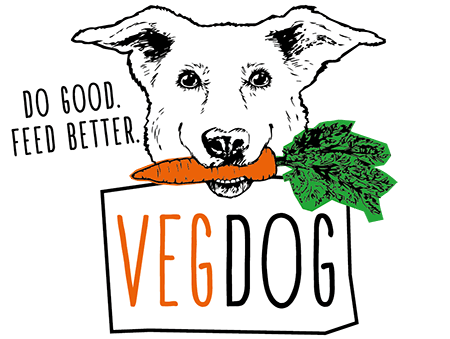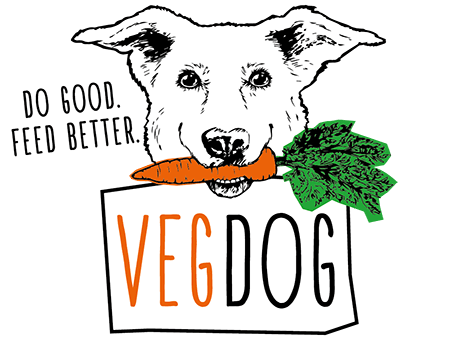Even among humans, vegan nutrition is a controversial topic that is often met with incomprehension. Arguments against a purely plant-based diet quickly pour in. Before you know it, you are informed about the numerous disadvantages, even though you have dealt with the topic much more intensively yourself and know the many advantages. The same can happen to you if you feed your beloved four-legged friend a vegan diet. Not only as producers of VEGDOG, who developed the vegan dog food with specialist veterinarians, but also as dog owners who feed it with a clear conscience, we are often insulted and confronted with various arguments against a vegan dog diet. How do you react to this and how do you refute the many unfounded prejudices? We have taken up the most common points of criticism for you and examined them in more detail.
The most important information at a glance
- Today's domestic dog no longer has much in common with the wolf - therefore its diet has also changed over the centuries.
- Plant-based food can now be easily digested by dogs.
- Some dogs are allergic to animal proteins.
- It is not necessarily the type of food that matters, but rather whether it meets the animal's nutritional needs.
- VEGDOG's vegan dog food is analytically proven to meet 100% of your dog's needs and can therefore contribute to a healthy diet.
Prejudice 1: Feeding dogs a vegan diet is not species-appropriate
We often ask ourselves what this statement refers to? To the wolf? Or to the "wild dog"? Both live in the wild without contact with humans, and do not wear collars or harnesses. They relieve themselves whenever they want and do not visit a veterinarian to cure illnesses and thus prolong their lives. They do not eat every day anyway, and riding in a car is a completely unknown means of transport for them. They choose their partners themselves.
Putting dogs on the same level as their ancestors is a lame comparison for us, because the way our four-legged friends live has nothing to do with that of wolves. According to the latest findings, dogs joined humans around 100,000 years ago. During this time, they became domesticated animals and no longer have much in common with their wild ancestors. The same thing is happening to us humans. Although we have the same ancestors as great apes, our lifestyle and diet have changed enormously. And yet we have no doubt that the life we lead today is appropriate for our species. We have simply evolved.
Prejudice 2: The best way to feed a dog healthily is BARF and not vegan dog food
Barfing has been a very popular feeding method for many years. Here, too, the origin of the wolf is referred to, whose main food component is considered to be raw meat. What is often overlooked is that wolves devour their prey whole, including skin and hair. Internal organs, bones and cartilage are also consumed and provide many nutrients that are not contained in pure meat.
Added to this is the fact that wolves have a much lower life expectancy than our dogs. In order to cover the complete requirement of minerals, trace elements and vitamins, all components must be fed in a specific composition. Supplementing with a mineral powder in conjunction with nutritional advice from a competent veterinarian is usually essential in order to be sure that your four-legged friend is being fed according to his needs.
Unfortunately, many owners are still not aware of this, as a study by Natalie Dillitzer has already shown. It turned out that a large proportion of the BARF rations examined (60%) had equally serious deficiencies. It is not the type of feeding but the composition that meets the needs that determines the quality of a ration. A meat-based diet can therefore also lead to malnutrition and deficiencies if it is not calculated in a balanced way.
Vegan dog food could help your four-legged friend, especially if he or she has a food intolerance. Many dog owners don't even know that animal proteins are one of the main allergens for dogs. For those with severe food allergies, vegan dog food could therefore be a healthy alternative. VEGDOG meets your dog's needs and is 100% plant-based and gluten-free.
Prejudice 3: The consumption of plant-based, carbohydrate-rich food is unhealthy and not intended for dogs
In the course of domestication, dogs not only adapted to humans in terms of behavior, but their digestion also had to adapt to the available food supply. Since meat was a luxury item, it only very rarely ended up in the food bowl as leftovers.
Since the study by an (independent!) Swedish research team was published in 2013, we know that dogs have evolved genetically and can digest carbohydrates in far greater quantities than wolves and even more efficiently than horses. This is due to a better enzyme system. However, we would also like to point out that not every plant-based food component consists exclusively of carbohydrates.
Peas, lentils, lupins and many other plant-based protein sources contained in vegan dog food provide our four-legged friends with important proteins in an optimal amino acid composition, so meat is not necessary. As long as the vegan dog food optimally covers your four-legged friend's protein requirements and the supply of all other macro and micronutrients, it is anything but unhealthy.
Prejudice 4: The dog’s intestine is far too short to digest plant-based food
The intestines of our domestic dogs are actually shorter than those of various animals that are primarily designed to utilize plant-based food components. However, it must be clearly emphasized that plant-based components of vegan dog food are not provided in their raw state.
As with conventional meat-based food, the raw materials are broken down during the manufacturing process and can therefore be used by the dog in sufficient quantities. Of course, we do not use raw lentils, peas or lupin beans, but rather highly broken down, extruded lentil, pea or lupin protein, which the dog can use very well even with its shorter intestines. So there is nothing anatomically standing in the way of vegan dog food.
Prejudice 5: A purely vegan diet cannot possibly provide the dog with all the nutrients it needs
The dog does not need the meat itself, but the nutrients it contains. Almost all substances contained in animal products can be replaced with plant-based alternatives. It is often said that dogs need animal protein in order to survive.
Through extensive analyses, it has been discovered that there are plant-based protein sources that have a similar amino acid composition to meat. Since scientists are currently discussing the necessity of taurine and carnitine intake, these substances should be added to vegan dog food. The same applies to the amino acid methionine.
In cats, taurine supplementation is common practice despite their diet containing meat, but no one questions this. In fact, many deficiency symptoms occur in dogs and cats that are fed a diet containing meat, as the diet is not automatically supplemented with the appropriate nutrients.
Prejudice 6: You would force your own way of life on the dog: feeding a dog a vegan diet is animal cruelty
If the dog is not allowed to hunt for its own food, it must eat whatever is put in the bowl. Every owner has different opinions about what form of food is acceptable for their four-legged friend. This means that every dog is more or less forced to eat the food that their owner thinks is right. In our view, the primary responsibility is to provide the dog with all the necessary minerals, trace elements and vitamins that it needs to stay healthy.
As already mentioned, studies have shown that many home-made meat-based rations contain a deficiency and/or an excess of various substances. Of course, nobody wants to intentionally harm their pet. Of course, many raw food portions are balanced and are eaten with pleasure. However, we believe that it is more like torture to not feed your dog what it needs than to provide it with everything it needs, but on a plant-based basis with a vegan dog food.
Prejudice 7: The vegan lifestyle is a trend: Selling vegan dog food is just a way to rip people off
Maybe some people are really following a trend by feeding themselves and their dogs a vegan diet. However, the majority are protesting against the unacceptable conditions under which cattle, poultry, etc. have to suffer in factory farming. We keep getting reports in which dog owners confirm that their four-legged friends are doing much better after years of suffering by switching to vegan dog food with VEGDOG. Since not everyone can cook for their pet, it is a relief to be able to rely on high-quality ready-made food.
We keep getting reports from dog owners who confirm that their four-legged friends are doing much better after years of suffering by switching to vegan dog food with VEGDOG. Since not everyone can cook for their pet, it is a relief to be able to rely on high-quality ready-made food.
We at VEGDOG can of course only talk about our motives for producing a vegan complete food for dogs. We ourselves were missing a product on the market that met our requirements. We turned down offers to produce vegetarian dog food for ethical reasons, even though that would probably have brought us far more income.
Discover the benefits of vegan dog food
We are increasingly seeing a greater tolerance for the human vegan lifestyle. More and more people are also opening up to plant-based nutrition for their four-legged friends. We are working on bringing vegan dog food into the mainstream of society so that all these discussions will soon be a thing of the past. Until then, we will certainly be speechless at how unthinkingly other people judge us. But we only have to look at our dogs to make sure that we are on the right path.
 Lisa Walther
Lisa Walther








